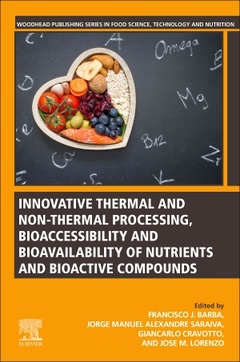Description
Innovative Thermal and Non-Thermal Processing, Bioaccessibility and Bioavailability of Nutrients and Bioactive Compounds
Coordinators: Barba Francisco J., Saraiva Jorge M.A., Cravotto Giancarlo, Lorenzo Jose M.
Language: English
Subjects for Innovative Thermal and Non-Thermal Processing...:
370 p. · 15x22.8 cm · Paperback
Description
/li>Contents
/li>Readership
/li>Biography
/li>Comment
/li>
Innovative Thermal and Nonthermal Processing, Bioacessibility and Bioavailability of Nutrients and Bioactive Compounds presents the implications of conventional and innovative processing on the nutritional and health aspects of food products. Chapters cover the relationship between gastronomic science, nutrition and food science in the development of healthy products, introduce the most commonly used conventional and innovative approaches to preserve foods and extract valuable compounds, describe how processing affects bioavailability and bioaccessibility of lipids, particularly fatty acids, protein, amino acids and carbohydrates, and discuss how processing affects bioavailability and bioaccessibility of minerals, water-soluble vitamins, and fat soluble vitamins.
Final sections cover processing, bioavailability and bioaccessibility of bioactive compounds, describing how processing (conventional and non-conventional) is affecting to bioavailability and bioaccessibility of bioactive sulphur compounds, polyphenols, flavonoids, and bioactive peptides.
Section 1. Introduction 1. An integrated strategy between gastronomic science, nutrition, and food science in the development of healthy products 2. Methods for determining bioavailability and bioaccessibility of bioactive compounds and nutrients 3. Green technologies for food processing: Main aspects
Section 2. Processing, bioavailability and bioaccessibility of macronutrients 4. Lipids and fatty acids 5. Proteins and amino acids 6. Carbohydrates
Section 3. Processing, bioavailability and bioaccessibility of micronutrients 7. Minerals 8. Water-soluble vitamins 9. Fat soluble vitamins
Section 4. Processing, bioavailability and bioaccessibility of bioactive compounds 10. Sulphur compounds 11. Polyphenols 12. Bioactive peptides
Food technologists, nutritionists, food processors and agricultural engineers or who work in the food manufacturing industry and are seeking to improve their products from a nutritional point of view and/or design new functional products. Also of interest to graduate students in the aforementioned areas of research.
Nowadays, Dr. Barba is serving as Associate Editor of the prestigious Journals “Food Research International, "Journal of Food Composition and Analysis", "Journal of Food Processing and Preservation", “Molecules and "Frontiers in Nutrition", among others.
Dr. Jorge A. Saraiva is professor of food technology, biocatalysts and food biotechnology, among other subjects. He holds a PhD in biotechnology, with a specialization in food science and engineering. His research focus is on non-conventional/emergent processing, particularly on high pressure (~ 9000 atm) for: i) cold pasteurization of foods, food properties improveme
- Presents the implications of conventional and innovative processing on the nutritional and health aspects of food products
- Introduces the most commonly used conventional and innovative approaches to preserve foods and extract valuable compounds
- Explains how processing (conventional and non-conventional) affects the bioavailability and bioaccessibility of bioactive sulphur compounds, polyphenols, flavonoids and bioactive peptides




